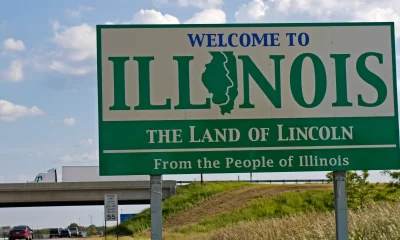Business
Missouri Lawmakers Want Weed Legalization Added to Upcoming Special Session

A bipartisan group of state lawmakers and cannabis advocates is calling on Missouri Gov. Mike Parson to include recreational marijuana legalization in an upcoming special legislative session.
A bipartisan group of state lawmakers and cannabis activists is calling on Missouri Governor Mike Parson to include recreational marijuana legalization in a special legislative session scheduled for later this month. The legislators and advocates also announced the launch of a campaign to oppose a voter initiative to legalize adult-use cannabis, which will appear on the Missouri ballot as Amendment 3 in the November general election.
Missouri state lawmakers will return to the state Capitol in Jefferson City on September 14 to debate a $700 million tax cut plan advanced by Parson. But cannabis activists and legislators including Republican state Representative Tony Lovasco are calling on the governor to add discussions for a marijuana legalization plan that could be passed before the electorate votes on Amendment 3, which is supported by the state’s medical marijuana industry.
“Rather than settle for an ill-suited and monopolistic program shoehorned into our (state) constitution, the Missouri General Assembly has a unique opportunity to consider legislation that would legalize cannabis in a truly free market fashion,” Lovasco said.
The state legislature considered a bill to legalize recreational cannabis in Missouri earlier this year, but the legislation stalled under intense lobbying pressure from the established medical marijuana industry. Instead, the medical cannabis lobby supported the initiative campaign for Amendment 3, which would give current medical marijuana licensees the first shot at recreational cannabis licenses and put a cap on the number of marijuana businesses that can operate in the state.
State officials announced on August 9 that Amendment 3 had qualified for the ballot for this fall’s general election. On August 19, however, opponents of marijuana legalization filed a lawsuit to block the initiative from the November ballot.
Whether Parson will grant the request and add adult-use cannabis legalization to the agenda for the special legislative session remains to be seen. The governor has received significant campaign funding from the medical marijuana industry and has publicly opposed the recreational marijuana legalization amendment, saying that it is a “disaster” that will mostly benefit “corporations behind marijuana.”
Missouri Group Opposes Amendment 3
Advocates for including marijuana legalization talks in the special legislative session repeated Parson’s complaints about Amendment 3. State Representative Wiley Price, a Democrat, said that the proposal would “corner the market for those already in position and continue a long tradition of predatory behavior on minority and poor communities.”
Opponents of Amendment 3 also note that the initiative includes provisions that criminalize some marijuana-related activities. Because the proposal is a constitutional amendment, changing it in the future will be a difficult process.
“We oppose any effort to put criminal or civil penalties for marijuana in the Missouri Constitution,” said Jeremy Cady, director of Americans for Prosperity Missouri. “The General Assembly should act to end marijuana prohibition and do so in a manner that adheres to free market principles.”
“It can be changed, but it’s going to be very, very hard, so the people who put this in place, will have full control over whether something changes again,” added cannabis activist Timothy Gilio.
John Payne, campaign manager for Legal Missouri 2022, the group campaigning for the passage of Amendment 3, criticized Eapen Thampy, a lobbyist who is helping organize opposition to the ballot measure. He said if voters approve Amendment 3, it would “ruin [Thampy’s] business model of lobbying for failed marijuana legalization efforts year after year.”
“In November, we will become the 20th state to legalize, tax and regulate marijuana and the first state to vote for automatic expungement of past, non-violent marijuana offenses,” Payne said. “Amendment 3 will allow law enforcement to focus on serious and violent crime, while bringing millions in new revenues to Missourians.”
Business
New Mexico cannabis operator fined, loses license for alleged BioTrack fraud

New Mexico regulators fined a cannabis operator nearly $300,000 and revoked its license after the company allegedly created fake reports in the state’s traceability software.
The New Mexico Cannabis Control Division (CCD) accused marijuana manufacturer and retailer Golden Roots of 11 violations, according to Albuquerque Business First.
Golden Roots operates the The Cannabis Revolution Dispensary.
The majority of the violations are related to the Albuquerque company’s improper use of BioTrack, which has been New Mexico’s track-and-trace vendor since 2015.
The CCD alleges Golden Roots reported marijuana production only two months after it had received its vertically integrated license, according to Albuquerque Business First.
Because cannabis takes longer than two months to be cultivated, the CCD was suspicious of the report.
After inspecting the company’s premises, the CCD alleged Golden Roots reported cultivation, transportation and sales in BioTrack but wasn’t able to provide officers who inspected the site evidence that the operator was cultivating cannabis.
In April, the CCD revoked Golden Roots’ license and issued a $10,000 fine, according to the news outlet.
The company requested a hearing, which the regulator scheduled for Sept. 1.
At the hearing, the CCD testified that the company’s dried-cannabis weights in BioTrack were suspicious because they didn’t seem to accurately reflect how much weight marijuana loses as it dries.
Company employees also poorly accounted for why they were making adjustments in the system of up to 24 pounds of cannabis, making comments such as “bad” or “mistake” in the software, Albuquerque Business First reported.
Golden Roots was fined $298,972.05 – the amount regulators allege the company made selling products that weren’t properly accounted for in BioTrack.
The CCD has been cracking down on cannabis operators accused of selling products procured from out-of-state or not grown legally:
- Regulators alleged in August that Albuquerque dispensary Sawmill Sweet Leaf sold out-of-state products and didn’t have a license for extraction.
- Paradise Exotics Distro lost its license in July after regulators alleged the company sold products made in California.
Golden Roots was the first alleged rulebreaker in New Mexico to be asked to pay a large fine.
Source: https://mjbizdaily.com/new-mexico-cannabis-operator-fined-loses-license-for-alleged-biotrack-fraud/
Business
Marijuana companies suing US attorney general in federal prohibition challenge

Four marijuana companies, including a multistate operator, have filed a lawsuit against U.S. Attorney General Merrick Garland in which they allege the federal MJ prohibition under the Controlled Substances Act is no longer constitutional.
According to the complaint, filed Thursday in U.S. District Court in Massachusetts, retailer Canna Provisions, Treevit delivery service CEO Gyasi Sellers, cultivator Wiseacre Farm and MSO Verano Holdings Corp. are all harmed by “the federal government’s unconstitutional ban on cultivating, manufacturing, distributing, or possessing intrastate marijuana.”
Verano is headquartered in Chicago but has operations in Massachusetts; the other three operators are based in Massachusetts.
The lawsuit seeks a ruling that the “Controlled Substances Act is unconstitutional as applied to the intrastate cultivation, manufacture, possession, and distribution of marijuana pursuant to state law.”
The companies want the case to go before the U.S. Supreme Court.
They hired prominent law firm Boies Schiller Flexner to represent them.
The New York-based firm’s principal is David Boies, whose former clients include Microsoft, former presidential candidate Al Gore and Elizabeth Holmes’ disgraced startup Theranos.
Similar challenges to the federal Controlled Substances Act (CSA) have failed.
One such challenge led to a landmark Supreme Court decision in 2005.
In Gonzalez vs. Raich, the highest court in the United States ruled in a 6-3 decision that the commerce clause of the U.S. Constitution gave Congress the power to outlaw marijuana federally, even though state laws allow the cultivation and sale of cannabis.
In the 18 years since that ruling, 23 states and the District of Columbia have legalized adult-use marijuana and the federal government has allowed a multibillion-dollar cannabis industry to thrive.
Since both Congress and the U.S. Department of Justice, currently headed by Garland, have declined to intervene in state-licensed marijuana markets, the key facts that led to the Supreme Court’s 2005 ruling “no longer apply,” Boies said in a statement Thursday.
“The Supreme Court has since made clear that the federal government lacks the authority to regulate purely intrastate commerce,” Boies said.
“Moreover, the facts on which those precedents are based are no longer true.”
Verano President Darren Weiss said in a statement the company is “prepared to bring this case all the way to the Supreme Court in order to align federal law with how Congress has acted for years.”
While the Biden administration’s push to reschedule marijuana would help solve marijuana operators’ federal tax woes, neither rescheduling nor modest Congressional reforms such as the SAFER Banking Act “solve the fundamental issue,” Weiss added.
“The application of the CSA to lawful state-run cannabis business is an unconstitutional overreach on state sovereignty that has led to decades of harm, failed businesses, lost jobs, and unsafe working conditions.”
Business
Alabama to make another attempt Dec. 1 to award medical cannabis licenses

Alabama regulators are targeting Dec. 1 to award the first batch of medical cannabis business licenses after the agency’s first two attempts were scrapped because of scoring errors and litigation.
The first licenses will be awarded to individual cultivators, delivery providers, processors, dispensaries and state testing labs, according to the Alabama Medical Cannabis Commission (AMCC).
Then, on Dec. 12, the AMCC will award licenses for vertically integrated operations, a designation set primarily for multistate operators.
Licenses are expected to be handed out 28 days after they have been awarded, so MMJ production could begin in early January, according to the Alabama Daily News.
That means MMJ products could be available for patients around early March, an AMCC spokesperson told the media outlet.
Regulators initially awarded 21 business licenses in June, only to void them after applicants alleged inconsistencies with how the applications were scored.
Then, in August, the state awarded 24 different licenses – 19 went to June recipients – only to reverse themselves again and scratch those licenses after spurned applicants filed lawsuits.
A state judge dismissed a lawsuit filed by Chicago-based MSO Verano Holdings Corp., but another lawsuit is pending.
Source: https://mjbizdaily.com/alabama-plans-to-award-medical-cannabis-licenses-dec-1/
-

 Business2 years ago
Business2 years agoPot Odor Does Not Justify Probable Cause for Vehicle Searches, Minnesota Court Affirms
-

 Business2 years ago
Business2 years agoNew Mexico cannabis operator fined, loses license for alleged BioTrack fraud
-

 Business2 years ago
Business2 years agoAlabama to make another attempt Dec. 1 to award medical cannabis licenses
-

 Business2 years ago
Business2 years agoWashington State Pays Out $9.4 Million in Refunds Relating to Drug Convictions
-

 Business2 years ago
Business2 years agoMarijuana companies suing US attorney general in federal prohibition challenge
-

 Business2 years ago
Business2 years agoLegal Marijuana Handed A Nothing Burger From NY State
-

 Business2 years ago
Business2 years agoCan Cannabis Help Seasonal Depression
-

 Blogs2 years ago
Blogs2 years agoCannabis Art Is Flourishing On Etsy













